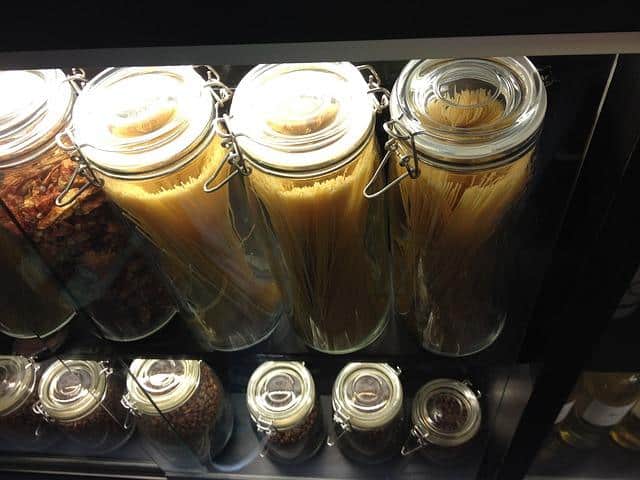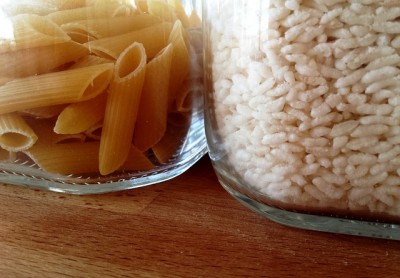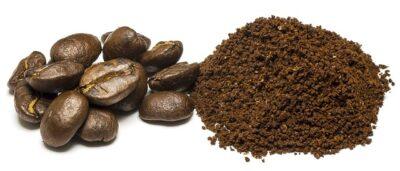Any thoughts about stockpiling foods in the event of a catastrophic emergency are dominated by two simple words: Shelf life. Some foods lose their nutritional value over time; others can become rancid or even dangerous if microbial or fungal growth invades the food. Curiously, there also are foods that have a shelf life measured in decades, if not centuries
We’re going to explore three general categories of foods that can be stored for various periods of time:
- Foods with an extremely long shelf life, even up to centuries.
- Foods with a very long shelf life (decades) due to their processing and packaging.
- Grocery store foods with a fairly long shelf life, six months to a year, or longer.
Foods With an Extremely Long Shelf Life
Some foods by their nature have surprisingly long shelf life if packaged and stored properly. Many are available at your local grocery store for a relatively low cost but you may want to consider repackaging or further sealing them if you plan to store them for any significant length of time. Here’s the top 10 long-term food storage champs:
1. Honey
A story about honey that’s often touted was the discovery by archaeologists of honey jars in an ancient Egyptian tomb. The honey was carbon dated as 3,000 years old and was still food-safe and tasted just like honey.
2. Salt
If you can keep the moisture out of stored salt it will last indefinitely. Salt is a standard staple in any long-term food storage plan and is used in food preservation methods such as curing and pickling.
3. Sugar
Sugar possesses many of the characteristics of salt but here again, moisture is the enemy. If you can keep it hermetically sealed and perhaps add a moisture absorber, sugar also can keep indefinitely.
4. White rice
White rice can last up to 20 years if properly stored. As a staple of most diets around the world, it’s a must in any long-term storage plan.
5. Whole wheat grains
Whole wheat grains are usually purchased through a supplier that specializes in long-term food storage. They are often sealed in large, foil packages and sometimes repackaged inside large plastic buckets.
The Easiest Way To Store A Month’s Worth Of Emergency Food!
The foil package is hermetically sealed to remove oxygen and prevent the permeation of moisture. If processed, packaged and stored properly it can last for decades. Remember that you’ll need a flour mill to further process any stored whole wheat grains.
6. Dried corn
Corn when properly dried and protected from moisture will last for decades. It’s another staple that provides significant nutritional value.
7. Baking soda
While it’s not a food source, its uses from baking to cleaning are many and varied. If kept dry it also will last indefinitely.
8. Instant coffee, cocoa powders and tea
If you succeed in keeping these ingredients dry they will survive for decades without losing potency or flavor.
9. Powdered milk
This staple will survive for up to 20 years. Moisture absorber packets are highly recommended when storing powdered milk for the long-term although some packaging solutions – such as in #10 cans – might not require them.
10. Bouillon products
This may seem a bit redundant with salt, but bouillon products have the added value of flavor. Most are chicken or beef flavored and the granular type tends to store better that bouillon cubes in the long run. With proper processing, packaging and storage, they can last for decades as well.
Foods With a Very Long Shelf Life
Some companies today are in the business of specifically selecting, processing and packaging foods that will typically have a stable shelf life of 20 to 30 years if stored properly.
These are the some of the common foods packaged to have a very long shelf life:
- Dried beans, 30 years
- Rolled oats, 30 years
- Pasta products, 30 years
- Potato flakes, 30 years
- Dehydrated fruit slices, 30 years
- Dehydrated carrots, 20 years
These are great items to stockpile because you can be reasonably assured they will retain their integrity and nutritional value for years to come.
Foods With a Fairly Long Shelf Life
Some foods can last a relatively long time but it’s measured in months or a couple of years as opposed to decades. As a general rule, you should pay attention to the expiration dates on bottles, cans and boxes purchased at a grocery store. You can still eat the food after the expiration date, but there may be a loss of nutritional value. Also, packages – such as boxes or bags – are more likely to allow compromise due to moisture or rodent invasion.
The World’s Healthiest Survival Food — And It Stores For YEARS and YEARS!
If you are thinking about storing any oils for the long-term, regular olive oil is a hero with a shelf life of two years. If you want to adapt grocery store foods for long-term food storage, you should seriously consider some packaging solutions that can allow you to protect and preserve these items. This includes using sealed cans and both oxygen and moisture absorbers. Keep in mind, you also can order from a reliable purveyor of long-term foods and buy in bulk.
An important consideration for the shelf life of any food is how it is processed, packaged, stored and rotated.
Processing
The way that any food is processed has a lot to do with shelf life. Typical processing approaches include dehydrating, freeze-drying, pasteurization, heat processing, curing and pickling. While all of these processes extend the shelf life of many foods, the nature of the food itself determines how long it will remain edible.
Packaging
The integrity of packaging is as important as the processing. Typical long-term food storage strategies involve packaging dried or dehydrated foods in metal, #10 cans that are hermetically sealed and often have oxygen and moisture absorbers enclosed.
Another long-term packaging solution involves the use of large, 5-gallon plastic buckets. This is usually used for bulk items such as white rice, flour, sugar, salt and other staples that someone wants to store in a large quantity. Make sure you inquire about the integrity of the seal on the lid. I had five gallons of sugar in storage for five years and when I open the lid, mildew had permeated the bucket. Not a single teaspoon was edible.
Storage
Storage has a direct effect on the duration of shelf life. The cooler the temperatures the longer the shelf life, but be careful to avoid freezing temperatures.
A dry environment is also important. Mildew can permeate the seal on some food containers, moisture can cause oxidation of metallic cans, and certain foods like grains can actually sprout if exposed to moisture over a period of time.
Darkness is important for any foods stored in glass jars, and in general advised because direct sunlight will raise temperatures.
Rotation
As I’ve noted, some foods have a shelf life measured in months. That really doesn’t qualify as long-term in the classical sense so you should practice “eat what you store, store what you eat.” This means you should eat from your food stash and keep it organized so that you are always using the food that has been in storage the longest, first.
The Bottom Line
Do your homework. Long-term food storage requires a plan that not only assesses the foods you should store, but the number of people you plan to feed and for how long. It’s the duration that makes shelf life such a critical consideration. As much as possible, rotate your stock of foods by eating what you store. If you simply want to store food and forget about it unless it’s needed in an emergency, make sure it’s packaged and stored properly and that you know its expiration date.
From your experience, which foods last the longest? Share your tips in the section below:
Discover The Secret To Saving Thousands At The Grocery Store. Read More Here.
 Off The Grid News Better Ideas For Off The Grid Living
Off The Grid News Better Ideas For Off The Grid Living






